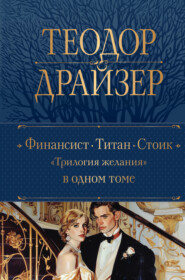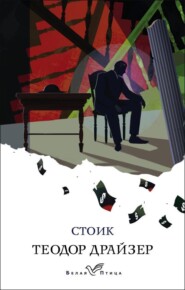По всем вопросам обращайтесь на: info@litportal.ru
(©) 2003-2024.
✖
Sister Carrie / Сестра Кэрри. Книга для чтения на английском языке
Настройки чтения
Размер шрифта
Высота строк
Поля
On this trip he enjoyed himself thoroughly, and when it was over he was sorry to get back. He was not willingly a prevaricator, and hated thoroughly to make explanations concerning it. The whole incident was glossed over with general remarks, but Mrs. Hurstwood gave the subject considerable thought. She drove out more, dressed better, and attended theatres freely to make up for it.
Such an atmosphere could hardly come under the category of home life. It ran along by force of habit, by force of conventional opinion. With the lapse of time it must necessarily become dryer and dryer – must eventually be tinder, easily lighted and destroyed.
Chapter X
The Counsel of Winter: Fortune’s Ambassador Calls
In the light of the world’s attitude toward woman and her duties, the nature of Carrie’s mental state deserves consideration. Actions such as hers are measured by an arbitrary scale. Society possesses a conventional standard whereby it judges all things. All men should be good, all women virtuous. Wherefore, villain, hast thou failed?[41 - Wherefore, villain, hast thou failed? – А потому, о преступница, как смела ты перешагнуть за пределы дозволенного?]
In the view of a certain stratum of society, Carrie was comfortably established – in eyes of the starveling, beaten by every wind and gusty sheet of rain, she was safe in a halcyon harbor. Drouet had taken three rooms, furnished, in Ogden Place, facing Union Park, on the West Side. That was a little, green-carpeted breathing spot than which, to-day, there is nothing more beautiful in Chicago.[42 - That was a little, green-carpeted breathing spot than which, today, there is nothing more beautiful in Chicago. – И тогда уже эта площадь, красивее которой нет сейчас в Чикаго, представляла собой сплошной зеленый газон.] It afforded a vista pleasant to contemplate. The best room looked out upon the lawn of the park, now sear and brown, where a little lake lay sheltered. Over the bare limbs of the trees, which now swayed in the wintry wind, rose the steeple of the Union park Congregational Church, and far off the towers of several others.
The rooms were comfortably enough furnished. There was good Brussels carpet on the floor, rich in dull red and lemon shades, and representing large jardinières[43 - jardiniиres – (фр.) жардиньерка] filled with gorgeous, impossible flowers. There was a large pier-glass mirror[44 - pier-glass mirror – трюмо] between the two windows. A large, soft, green, plush-covered couch occupied one corner, and several rocking-chairs were set about. Some pictures, several rugs, a few small pieces of bric-а-brac, and the tale of contents is told.
In the bedroom, off the front room, was Carrie’s trunk, bought by Drouet, and in the wardrobe built into the wall quite an array of clothing – more than she had ever possessed before, and of very becoming designs. There was a third room for possible use as a kitchen, where Drouet had Carrie establish a little portable gas stove for the preparation of small lunches, oysters, Welsh rarebits[45 - Welsh rarebits – гренки по-валлийски (с сыром)], and the like, of which he was exceedingly fond; and, lastly a bath. The whole place was cozy, in that it was lighted by gas and heated by furnace registers, possessing also a small grate, set with an asbestos back, a method of cheerful warming which was then first coming into use. By her industry and natural love of order, which now developed, the place maintained an air pleasing in the extreme.
Here, then, was Carrie, established in a pleasant fashion, free of certain difficulties which most ominously confronted her, laden with many new ones which were of a mental order, and altogether so turned about in all of her earthly relationships that she might well have been a new and different individual. She looked into her glass and saw a prettier Carrie than she had seen before; she looked into her mind, a mirror prepared of her own and the world’s opinions, and saw a worse. Between these two images she wavered, hesitating which to believe.
“My, but you’re a little beauty,” Drouet was wont to exclaim to her.
She would look at him with large, pleased eyes.
“You know it, don’t you?” he would continue.
“Oh, I don’t know,” she would reply, feeling delight in the fact that one should think so, hesitating to believe, though she really did, that she was vain enough to think so much of herself.
Her conscience, however, was not a Drouet, interested to praise. There she heard a different voice, with which she argued, pleaded, excused. It was no just and sapient counselor, in its last analysis. It was only an average little conscience, habit, convention, in a confused way. With it, the voice of the people was truly the voice of God.
“Oh, thou failure!” said the voice.
“Why?” she questioned.
“Look at those about,” came the whispered answer. “Look at those who are good. How would they scorn to do what you have done. Look at the good girls; how will they draw away from such as you when they know you have been weak. You had not tried before you failed.”
It was when Carrie was alone, looking out across the park, that she would be listening to this. It would come infrequently – when something else did not interfere when the pleasant side was not too apparent, when Drouet was not there. It was somewhat clear in utterance at first, but never wholly convincing. There was always an answer, always the December days threatened. She was alone; she was desireful; she was fearful of the whistling wind. The voice of want made answer for her.
Such mental conflict was not always uppermost. Carrie was not by any means a gloomy soul. More, she had not the mind to get firm hold upon a definite truth. When she could not find her way out of the labyrinth of ill-logic which thought upon the subject created, she would turn away entirely.
Drouet, all the time, was conducting himself in a model way for one of his sort. He took her about a great deal, spent money upon her, and when he traveled took her with him. There were times when she would be alone for two or three days, while he made the shorter circuits of his business, but, as a rule, she saw a great deal of him.
“Say. Carrie,” he said one morning, shortly after they had so established themselves, “I’ve invited my friend Hurstwood to come out some day and spend the evening with us.”
“Who is he?” asked Carrie, doubtfully.
“Oh, he’s a nice man. He’s manager of Fitzgerald and Moy’s.”
“What that?” said Carrie.
“The finest resort in town. It’s a way-up, smell place.”[46 - The finest resort in town. It’s a way-up, smell place. – Один из самых излюбленных баров в городе. Шикарное место.]
Carrie puzzled a moment. She was wondering what Drouet had told him, what her attitude would be.
“That’s all right,” said Drouet, feeling her thought.
“He doesn’t know anything. You’re Mrs. Drouet now.”
There was something about this which struck Carrie as slightly inconsiderate. She could see that Drouet did not have the keenest sensibilities.
“Why don’t we got married?” she inquired, thinking of the voluble promise he had made.
“Well, we will,” he said, “just as soon as I get this little deal of mine closed up.”
He was referring to some property which he said he had, and which required so much attention, adjustment, and what not, that somehow or other it interfered with his free moral, personal actions.
“Just as soon as I get back from my Denver trip in January we’ll do it.”
Carrie accepted this as basis for hope – it was a sort of salve to her conscience, a pleasant way out. Under the circumstances, things would be righted. Her actions would be justified.
She really was not enamored of Drouet. She was more clever than he. In a dim way, she was beginning to see where he lacked. If it had not been for this, if she had not been able to measure and judge him a way, she would have been utterly wretched in her fear of not gaining his affection, of losing his interest, of being swept away and left without an anchorage. As it was, she wavered a little, slightly anxious, at first, to gain him completely, but later feelings at ease in waiting. She was not exactly sure what she thought of him – what she wanted to do.
When Hurstwood called, she met a man who was more clever than Drouet in a hundred ways. He paid that peculiar deference to women which every member of the sex appreciates. He was not overawed, he was not overbold. His great charm was attentiveness. Schooled in winning those birds of fine feather among his own sex, the merchants and professionals who visited his resort, he could use even greater tact when endeavouring to prove agreeable to some one who charmed him. In a pretty woman of any refinement of feeling whatsoever he found his greatest incentive. His was mild, placid, assured, giving the impression that he wished to be of service only – to do something which would make the lady more pleased.
Drouet had ability in this line himself when the game was worth the candle, but he was too much the egotist to reach the polish which Hurstwood possessed. He was too buoyant, too full of ruddy life, too assured. He succeeded with many who were not quite schooled in the art of love. He failed dismally where the woman was slightly experienced and possessed innate refinement. In the case of Carrie he found a woman who was all of the latter, but none of the former. He was lucky in the fact that opportunity tumbled into his lap[47 - He was lucky in the fact that opportunity tumbled into his lap – Ему повезло, что удача сама свалилась ему в руки], as it were. A few years later, with a little more experience, the slightest tide of success, and he had not been able to approach Carrie at all.
“You ought to have a piano here, Drouet,” said Hurstwood, smiling at Carrie, on the evening in question, “so that your wife could play.”
Drouet had not though of that.
“So we ought,” he observed readily. “Oh, I don’t play,” ventured Carrie.
“It’s isn’t very difficult,” returned Hurstwood. “You could do very well in a few weeks.”
He was in the best form for entertaining this evening.
“Suppose we have a little game of euchre?” suggested Hurstwood, after a light round of conversation. He was rather dexterous in avoiding everything that would suggest that he knew anything of Carrie’s past. He kept away from personalities altogether, and confined himself to these things which did not concern individuals at all. By his manner, he put Carrie at her ease, and by his deference and pleasantries he amused her. He pretended to be seriously interested in all she said.
“I don’t know how to play,” said Carrie.
“Charlie, you are neglecting a part of your duty,” he observed to Drouet most affably. “Between us, though,” he went on, “we can show you.”
By his tact he made Drouet feel that he admired his choice. There was something in his manner that showed that he was pleased to be there. Drouet felt really closer to him than ever before. It gave him more respect for Carrie. Her appearance came into a new light, under Hurstwood’s appreciation. The situation livened considerably.
“Now, let me see,” said Hurstwood, looking over Carrie’s shoulder very deferentially. “What have you?” He studied for a moment. “That’s rather good,” he said.
“You’re lucky. Now, I’ll show you how to trounce your husband. You take my advice.”
“Here,” said Drouet, “if you two are going to scheme together, I won’t stand a ghost of a show.[48 - I won’t stand a ghost of a show – у меня нет шансов выстоять] Hurstwood’s a regular sharp[49 - sharp – знаток, мастак].”
“No, it’s your wife. She brings me luck. Why shouldn’t she win?”
Such an atmosphere could hardly come under the category of home life. It ran along by force of habit, by force of conventional opinion. With the lapse of time it must necessarily become dryer and dryer – must eventually be tinder, easily lighted and destroyed.
Chapter X
The Counsel of Winter: Fortune’s Ambassador Calls
In the light of the world’s attitude toward woman and her duties, the nature of Carrie’s mental state deserves consideration. Actions such as hers are measured by an arbitrary scale. Society possesses a conventional standard whereby it judges all things. All men should be good, all women virtuous. Wherefore, villain, hast thou failed?[41 - Wherefore, villain, hast thou failed? – А потому, о преступница, как смела ты перешагнуть за пределы дозволенного?]
In the view of a certain stratum of society, Carrie was comfortably established – in eyes of the starveling, beaten by every wind and gusty sheet of rain, she was safe in a halcyon harbor. Drouet had taken three rooms, furnished, in Ogden Place, facing Union Park, on the West Side. That was a little, green-carpeted breathing spot than which, to-day, there is nothing more beautiful in Chicago.[42 - That was a little, green-carpeted breathing spot than which, today, there is nothing more beautiful in Chicago. – И тогда уже эта площадь, красивее которой нет сейчас в Чикаго, представляла собой сплошной зеленый газон.] It afforded a vista pleasant to contemplate. The best room looked out upon the lawn of the park, now sear and brown, where a little lake lay sheltered. Over the bare limbs of the trees, which now swayed in the wintry wind, rose the steeple of the Union park Congregational Church, and far off the towers of several others.
The rooms were comfortably enough furnished. There was good Brussels carpet on the floor, rich in dull red and lemon shades, and representing large jardinières[43 - jardiniиres – (фр.) жардиньерка] filled with gorgeous, impossible flowers. There was a large pier-glass mirror[44 - pier-glass mirror – трюмо] between the two windows. A large, soft, green, plush-covered couch occupied one corner, and several rocking-chairs were set about. Some pictures, several rugs, a few small pieces of bric-а-brac, and the tale of contents is told.
In the bedroom, off the front room, was Carrie’s trunk, bought by Drouet, and in the wardrobe built into the wall quite an array of clothing – more than she had ever possessed before, and of very becoming designs. There was a third room for possible use as a kitchen, where Drouet had Carrie establish a little portable gas stove for the preparation of small lunches, oysters, Welsh rarebits[45 - Welsh rarebits – гренки по-валлийски (с сыром)], and the like, of which he was exceedingly fond; and, lastly a bath. The whole place was cozy, in that it was lighted by gas and heated by furnace registers, possessing also a small grate, set with an asbestos back, a method of cheerful warming which was then first coming into use. By her industry and natural love of order, which now developed, the place maintained an air pleasing in the extreme.
Here, then, was Carrie, established in a pleasant fashion, free of certain difficulties which most ominously confronted her, laden with many new ones which were of a mental order, and altogether so turned about in all of her earthly relationships that she might well have been a new and different individual. She looked into her glass and saw a prettier Carrie than she had seen before; she looked into her mind, a mirror prepared of her own and the world’s opinions, and saw a worse. Between these two images she wavered, hesitating which to believe.
“My, but you’re a little beauty,” Drouet was wont to exclaim to her.
She would look at him with large, pleased eyes.
“You know it, don’t you?” he would continue.
“Oh, I don’t know,” she would reply, feeling delight in the fact that one should think so, hesitating to believe, though she really did, that she was vain enough to think so much of herself.
Her conscience, however, was not a Drouet, interested to praise. There she heard a different voice, with which she argued, pleaded, excused. It was no just and sapient counselor, in its last analysis. It was only an average little conscience, habit, convention, in a confused way. With it, the voice of the people was truly the voice of God.
“Oh, thou failure!” said the voice.
“Why?” she questioned.
“Look at those about,” came the whispered answer. “Look at those who are good. How would they scorn to do what you have done. Look at the good girls; how will they draw away from such as you when they know you have been weak. You had not tried before you failed.”
It was when Carrie was alone, looking out across the park, that she would be listening to this. It would come infrequently – when something else did not interfere when the pleasant side was not too apparent, when Drouet was not there. It was somewhat clear in utterance at first, but never wholly convincing. There was always an answer, always the December days threatened. She was alone; she was desireful; she was fearful of the whistling wind. The voice of want made answer for her.
Such mental conflict was not always uppermost. Carrie was not by any means a gloomy soul. More, she had not the mind to get firm hold upon a definite truth. When she could not find her way out of the labyrinth of ill-logic which thought upon the subject created, she would turn away entirely.
Drouet, all the time, was conducting himself in a model way for one of his sort. He took her about a great deal, spent money upon her, and when he traveled took her with him. There were times when she would be alone for two or three days, while he made the shorter circuits of his business, but, as a rule, she saw a great deal of him.
“Say. Carrie,” he said one morning, shortly after they had so established themselves, “I’ve invited my friend Hurstwood to come out some day and spend the evening with us.”
“Who is he?” asked Carrie, doubtfully.
“Oh, he’s a nice man. He’s manager of Fitzgerald and Moy’s.”
“What that?” said Carrie.
“The finest resort in town. It’s a way-up, smell place.”[46 - The finest resort in town. It’s a way-up, smell place. – Один из самых излюбленных баров в городе. Шикарное место.]
Carrie puzzled a moment. She was wondering what Drouet had told him, what her attitude would be.
“That’s all right,” said Drouet, feeling her thought.
“He doesn’t know anything. You’re Mrs. Drouet now.”
There was something about this which struck Carrie as slightly inconsiderate. She could see that Drouet did not have the keenest sensibilities.
“Why don’t we got married?” she inquired, thinking of the voluble promise he had made.
“Well, we will,” he said, “just as soon as I get this little deal of mine closed up.”
He was referring to some property which he said he had, and which required so much attention, adjustment, and what not, that somehow or other it interfered with his free moral, personal actions.
“Just as soon as I get back from my Denver trip in January we’ll do it.”
Carrie accepted this as basis for hope – it was a sort of salve to her conscience, a pleasant way out. Under the circumstances, things would be righted. Her actions would be justified.
She really was not enamored of Drouet. She was more clever than he. In a dim way, she was beginning to see where he lacked. If it had not been for this, if she had not been able to measure and judge him a way, she would have been utterly wretched in her fear of not gaining his affection, of losing his interest, of being swept away and left without an anchorage. As it was, she wavered a little, slightly anxious, at first, to gain him completely, but later feelings at ease in waiting. She was not exactly sure what she thought of him – what she wanted to do.
When Hurstwood called, she met a man who was more clever than Drouet in a hundred ways. He paid that peculiar deference to women which every member of the sex appreciates. He was not overawed, he was not overbold. His great charm was attentiveness. Schooled in winning those birds of fine feather among his own sex, the merchants and professionals who visited his resort, he could use even greater tact when endeavouring to prove agreeable to some one who charmed him. In a pretty woman of any refinement of feeling whatsoever he found his greatest incentive. His was mild, placid, assured, giving the impression that he wished to be of service only – to do something which would make the lady more pleased.
Drouet had ability in this line himself when the game was worth the candle, but he was too much the egotist to reach the polish which Hurstwood possessed. He was too buoyant, too full of ruddy life, too assured. He succeeded with many who were not quite schooled in the art of love. He failed dismally where the woman was slightly experienced and possessed innate refinement. In the case of Carrie he found a woman who was all of the latter, but none of the former. He was lucky in the fact that opportunity tumbled into his lap[47 - He was lucky in the fact that opportunity tumbled into his lap – Ему повезло, что удача сама свалилась ему в руки], as it were. A few years later, with a little more experience, the slightest tide of success, and he had not been able to approach Carrie at all.
“You ought to have a piano here, Drouet,” said Hurstwood, smiling at Carrie, on the evening in question, “so that your wife could play.”
Drouet had not though of that.
“So we ought,” he observed readily. “Oh, I don’t play,” ventured Carrie.
“It’s isn’t very difficult,” returned Hurstwood. “You could do very well in a few weeks.”
He was in the best form for entertaining this evening.
“Suppose we have a little game of euchre?” suggested Hurstwood, after a light round of conversation. He was rather dexterous in avoiding everything that would suggest that he knew anything of Carrie’s past. He kept away from personalities altogether, and confined himself to these things which did not concern individuals at all. By his manner, he put Carrie at her ease, and by his deference and pleasantries he amused her. He pretended to be seriously interested in all she said.
“I don’t know how to play,” said Carrie.
“Charlie, you are neglecting a part of your duty,” he observed to Drouet most affably. “Between us, though,” he went on, “we can show you.”
By his tact he made Drouet feel that he admired his choice. There was something in his manner that showed that he was pleased to be there. Drouet felt really closer to him than ever before. It gave him more respect for Carrie. Her appearance came into a new light, under Hurstwood’s appreciation. The situation livened considerably.
“Now, let me see,” said Hurstwood, looking over Carrie’s shoulder very deferentially. “What have you?” He studied for a moment. “That’s rather good,” he said.
“You’re lucky. Now, I’ll show you how to trounce your husband. You take my advice.”
“Here,” said Drouet, “if you two are going to scheme together, I won’t stand a ghost of a show.[48 - I won’t stand a ghost of a show – у меня нет шансов выстоять] Hurstwood’s a regular sharp[49 - sharp – знаток, мастак].”
“No, it’s your wife. She brings me luck. Why shouldn’t she win?”

















